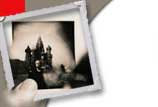 |
||
 |
||
| Yugoslavia | ||||
Witnessing the War  It was one of those freezing nights of March 1999 when I took the train, from the Romanian capital Bucharest, to go to Yugoslavia, a country in war just across the Danube. In spite of the warnings that many people gave me, I volunteered to go as an 18 years old reporter for the Romanian weekly newspaper "Dreptatea". |
||||
|
|
|
||||||||||
Yugoslavians having a huge target banner downtown Belgrade. Many were flying Yugoslav and Serbian flags. Some had Greek, Russian and Iraqi flags as sign of support of these nations for the Serbian cause. They were also singing in Russian the Kazachock, and the Sirtaki, in Greek.
The alarm center announcing the intrusion of enemy airplanes in the Yugoslavian airspace. The aerial attacks came every evening and frequently went on all night, rarely during the day in Belgrade. The raids began as warning sirens wailed and local TV and radio stations advised people to avoid panic and to prepare necessary personal items. Local residents in the capital responded calmly, although fear was clearly visible on the faces of mothers with small children and among the frail elderly.
Protesters having a " BEOGRAD SE SVET" banner, meaning Belgrade is the world. Some demonstrators carried pictures of Milosevic, while others held banners reading: "Slobo, You Are Chosen By God To Defend the Serbs." Pictures of Gen. Ratko Mladic, the former Bosnian Serb military commander and a U.N. court war crimes suspect, were also defiantly displayed.
In the back, a billboard saying STOP THE BOMBS and a Bill Clinton dummy hanged from a tree
A concert stage set up by Milosevic to keep the spirits high among Yugoslavians in the central city Square of the Republic. Here several ten thousand people gather every day to sing with the known singers of all genres - from pop singers Bora Corba and his hit "Air-plane, I will break your wings" and Bajaga, to stars of falk-dance Ceca Raznatovic (Arkan's wife) and Era Ojdanic. For the first time in Belgrade on the first day of the concerts, an American flag was set on fire. The absolute hit song of all the concerts titled "The Song Has Preserved Us" is the gypsy song "For Belgrade" from the film "Who is Singing There" (the song played on the accordian with the following refrain: "If this were just a dream, if this were just a dream"). Since air-raid alert is mostly sounded at the time when the concerts are held, those present pin black-and-white target signs somewhere on themselves and carry all sorts of banners - so far the most popular one is - "Sorry, we did not know it was invisible" occasioned by the shot down famous F-117 plane, but there are also a lot of vulgar ones referring to the Clinton-Lewinsky scandal. The atmosphere at the concerts was positive and for a couple of hours raised the spirit of the people.
A white trash can saying "White House garbage only"... In the center of Belgrade, some demonstrators carry banners listing the true "war criminals." Bill Clinton is at the top, sometimes followed by leaders of the NATO countries, Javier Solana, and even Christopher Columbus. For a nation that routinely relies on far more distant historical memories to prop up its claims to territory, that's not much of a stretch...That's also me in the back...
Destroying McDonald's was the duty of every Yugoslavian, taking into consideration that this was for them "American Imperialism".As NATO launched air raids to force Milosevic to accept a peace deal for Kosovo, pounding sites in the capital, anti-Western emotions erupted with angry crowds trashing the U.S. and Western European embassies.McDonald's was also attacked. Vandals, many of them crewcut young men uniformly dressed in black leather jackets and jeans, smashed everything, from the restaurants' windows to chairs. The Belgrade restaurant was forced to close down.
The American Library in Belgrade after the bombings.All three United States Information Agency libraries in Yugoslavia have been trashed by residents infuriated by NATO bombings. In Belgrade, assessments of damage to the Information Resource Center (IRC) at the United States Information Service building on the embassy compound and to an IRC reading room at the American Center have been difficult to obtain, but early reports said windows were broken there as well as at the IRC in Podgorica in Montenegro. The British Council, the Goethe Institute, and the French Cultural Center had all been trashed along with the American Center in Belgrade. On the walls are written things like "Albright,sorry we didn't know the F117 was invisible", "Serbia", "Dear Bill your Democracy is more efficient, Sincerely, Ku Klux Klan", "This is a toilet" and many other vulgarities.
A picture from Reuters  The human target badges were omnipresent allover Yugoslavia.The target sign was everywhere: adorning billboards, the clothes of young children, newspaper front pages, web sites, bridges and lapels of government ministers. Consisting of a black bull's-eye surrounded by two concentric circles, and usually attached to people or
In spite of the NATO bombings, some youngsters are still Chicago Bulls fans... That's me in the back... © Copyright by Dan Stoenescu 2001 Note: All pictures are taken in Yugoslavia, in March and April, 1999. All explanatory notes use information from official Yugoslavian and US sources, media, as well as personal interviews and testimonies. |
|||||||||||










